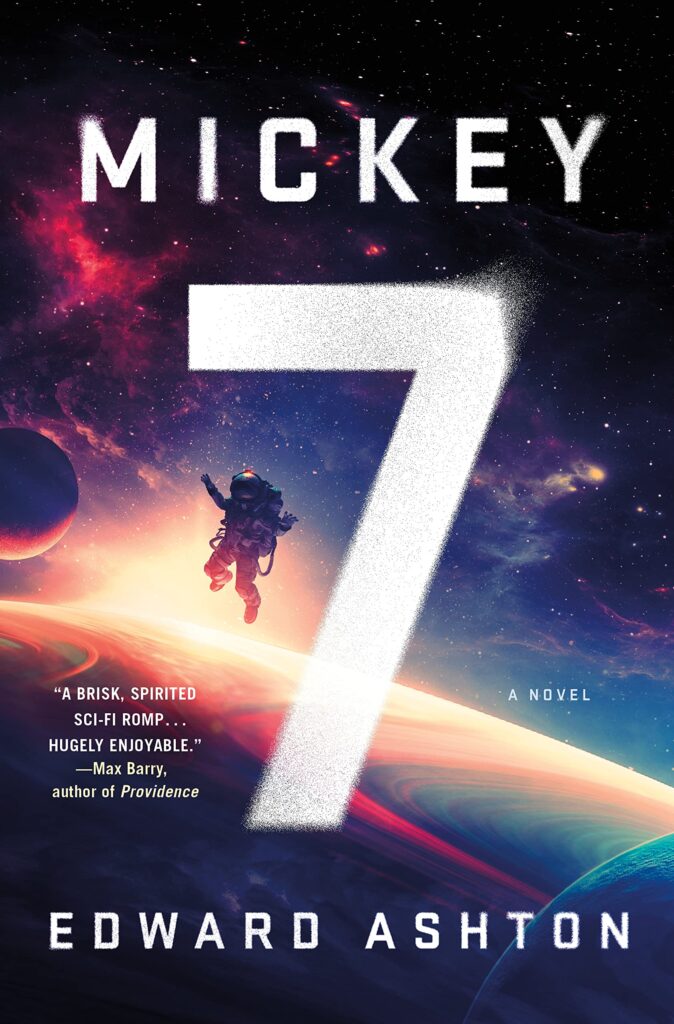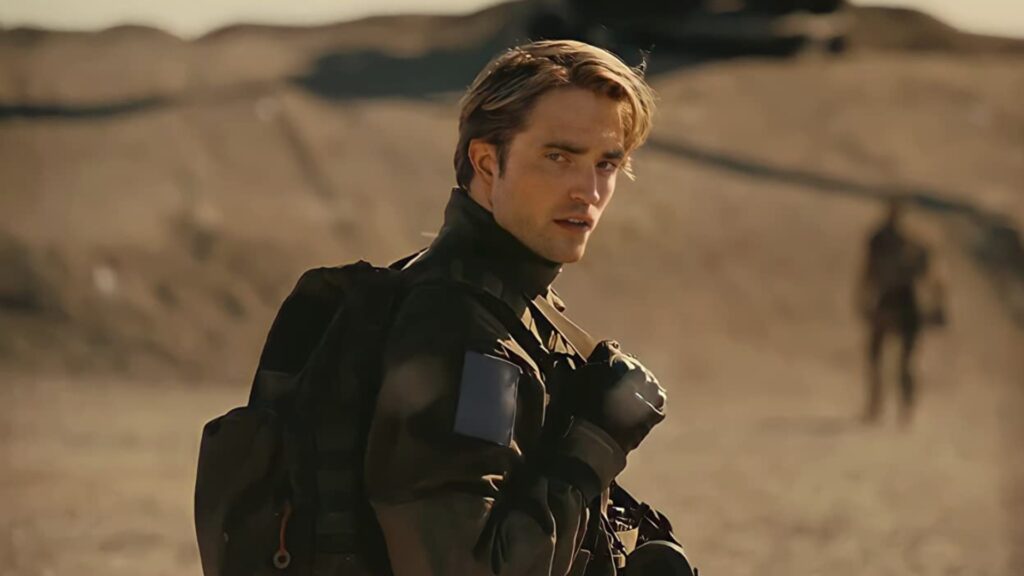Oh Mickey you’re so fine, you’re so fine you blow my mind, hey Mickey 7!!
Genre: Sci-Fi
Premise: Set in the future on a mining colony, an “expendable” named Mickey 7 – someone built to die over and over again on dangerous missions, their mind re-uploaded to their cloned successor – is erroneously assumed dead, and comes home to find out they’ve already created his replacement, Mickey 8.
About: I always pay attention to what an actor, at his hottest point, chooses for his next project. Because when you’re at your hottest point, you’re being offered the best roles in Hollywood. So whatever you choose in that moment tells us writers something about what actors are looking for. At Robert Pattinson’s peak of stardom – as he played the Batman, which was in theaters at the time – he announced that this would be his next project. Parasite’s Bong Joon Ho is directing.
Writer: Edward Ashton
Details: 280 pages

One of the paradoxes present in my life is that I love sci-fi yet dislike so many sci-fi movies I’ve seen lately.
Moonfall, Tenet, The Tomorrow War, Dune, Reminiscence, The Adam Project, Interstellar, Infinite, Life, Blade Runner 2049.
Where the good stuff at?
What I like in a sci-fi script is rich mythology and a good story that moves along at a brisk pace. A good example would be The Martian.
Some of you are probably angry that I’m including “Dune” in movies I don’t like. Dune is the perfect example, for me, of a movie that only gets it half right. It has a rich mythology. But it slogs along at a glacial pace. Then you have something like The Adam Project. That movie moves along at a brisk pace but has some of the weakest mythology this side of Battlefield Earth.
I need both.
Let’s see how today’s novel fares. And whether it will make a stellar movie or not.
Mickey 7 is an “expendable.” He lives in a colony on a planet far away, with about 200 people on it. Mickey has a unique job. He goes out on dangerous missions – usually to suss out whether giant worm-like “creepers” are threatening the base – to die. His deaths give the colony data they can use to stay safer.
As soon as he dies, his backup consciousness is uploaded into a new cloned version of him. So Mickey never truly dies. When we meet Mickey, he’s dropped into a new area and falls through the ice into an underground cavern where a giant worm-like “creeper” sizes him up. Mickey calls base, says he’s about to die, and then waits for the end to come.
But when the worm doesn’t eat him, he finds his way back to the surface and back to base. Except, now, Mickey 8 is in his room. Mickey 7 and Mickey 8 quickly discover that they don’t want to kill each other. So they’re going to try to live together. Which is going to be hard because the base recently instituted a 2000 calorie limit for everyone due to a slow-down in food production. That means each Mickey only gets 1000 calories a day.
In addition to this, our Mickey twins are going to have to fool Mickey’s girlfriend, flight commander Nasha, and Mickey’s best friend, pilot Berto. If they can do that, maybe they can make this “two Mickeys are better than one Mickey” plan work. But when the super angry base commander gets word that something is up, the Mickeys will need to accelerate a plan for figuring out the true purpose of Mickey.

Back in the day, there was this trick literary agents used to use in order to sell scripts. They would send a script off to several buyers at once, let each buyer know that other buyers were reading, which would result in studios quickly reading through the first act to see if they had a movie here, then bidding before they reached the second act, just to beat the competition to the punch.
This is what allowed so many bad scripts to get purchased. When you write a high concept script, the first act is the easiest part. You just introduce your cool concept and you don’t have to prove that it can result in a good movie because the studio doesn’t even get to the second act.
This trend of novels becoming the new spec scripts has a similar con in play. Nobody has time to read anything. Nor does anybody in Hollywood like to read. Agents know this. So they send these books out knowing that nobody is going to read more than 30 pages because doing so would take up 8 hours of their day.
So buyers read the first 30 pages, and if they like the setup, they buy the property. Which has to be how this book got through the system. Because if anybody read the last 200 pages of this, they would not have purchased it. It’s not that it’s bad. But it fails at its primary goal – which is to exploit its concept.
This movie is built around the idea that a guy comes back to find that they’ve already created a new copy of him. Two living copies is illegal. They’re not allowed to exist. That’s our setup. So how does our author explore this dilemma?
One of the copies ends up taking a lot of naps.
No. I’m serious.
This is how the author explores the idea. By ignoring it. He keeps Mickey 8 back in the room so that Mickey 7 can go walk around the base.
The only way this premise works is if we’re scared for Mickey 7. That being discovered would mean instant termination. Yet we’re never once scared for Mickey 7. There are veiled insinuations that bad things might happen if they’re caught. But they’re all so vague, we’re not even kind of worried for Mickey.
What’s frustrating about Mickey 7 is that there are some intriguing ideas being explored in the book. This ongoing question of, is Mickey 8 still Mickey 7, and is Mickey 7 still Mickey 6, going all the way back to Mickey 1? That’s a cool question to think about.
It’s the same concept Christopher Nolan explored in The Prestige, I believe. If you’re immediately uploaded to a new body when you die, did the last version of you die or did you really get transferred?
I liked how this script played with that idea when Mickey 7 discovers Mickey 8. Before this, Mickey 7 was okay with dying because he’d still be alive once his new clone was created. But his new clone – Mickey 8 – has already been birthed. So this person in front of him was already developing his own life and, therefore, wouldn’t be Mickey 7, if Mickey 7 were to voluntarily die.
The book also explores some really interesting backstory stuff about other colonies that went haywire. For example, there was another colony where everybody died except for the expendable and, to make up for it, the expendable kept recreating himself until there were 200 expendables in the colony and no real people. There were several backstories like that that got your noggin thinking.
However, these previous stories were bittersweet to read as they were all a lot more interesting than what was happening in our story, which amounted to, “I’m going to nap for a while, then I want to come out and get some food.”
This was a writing lesson I learned way too late in life. If your characters are talking about things that happened to them (or situations that mirror their lives), and those things are more interesting than the story you’re actually telling? You should probably consider ditching your current draft and writing one of *those* stories. I would’ve loved to have read the version of this where the expendable keeps replicating himself until he takes over the entire base.
If I were this writer, I would’ve sat down and asked myself, how can I exploit this idea as much as possible? For example, there was a brief moment, towards the middle of the book, where I thought Ashton had done something brilliant. I thought that he was actually slipping in and out of Mickey 7 and Mickey 8’s POV and telling the story through their points-of-view without telling us that he’d switched. And we were going to be tasked with trying to figure who was who. Cause they both think they’re Mickey, right? So it would stand to make sense that when telling this story, they both sound the same. And it’s up to us to decipher what’s going on.
Instead, we get this very straight-forward execution that amounts to Nap-Gate and a Tremors ripoff.
Why, then, did Robert Pattinson sign on to this project? That answer is in the What I Learned section below!
[ ] What the hell did I just read?
[x] wasn’t for me
[ ] worth the read
[ ] impressive
[ ] genius
What I learned: With this novel being only okay, it leaves me to conclude that there was only one reason why Pattison signed onto it. He signed on for the same reason so many actors before him have taken these types of roles – because he gets to play two different people. It seems almost too easy of a strategy as a screenwriter. But if you want to grab that big-name actor, write a dual role screenplay. It’s one of the most effective strategies in the book.

